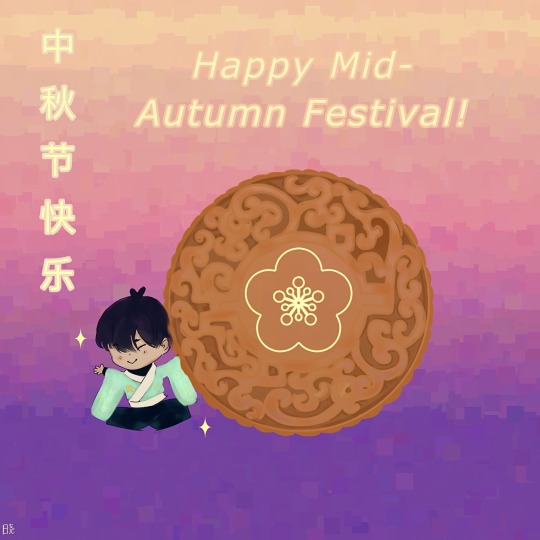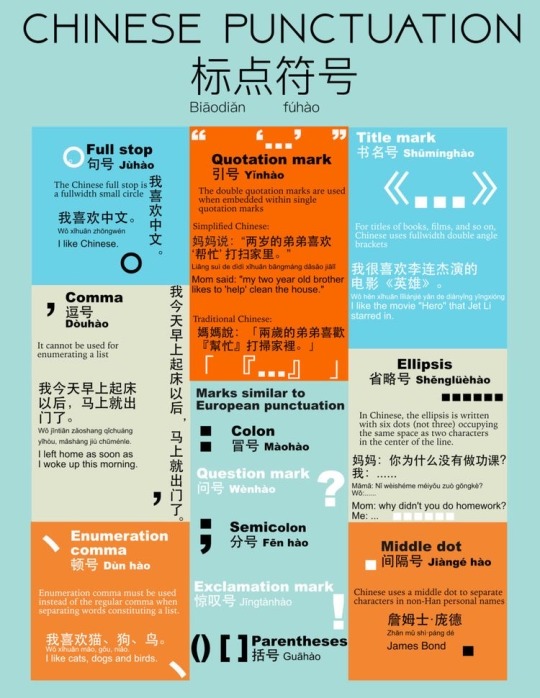dizonxiao
46 posts
中文 langblr/culture blog • he/him 他 • 18• 我叫晓🌅!
Don't wanna be here? Send us removal request.
Text
Vocab:
中(zhōng): middle
秋(qiū):autumn
节(jié):festival
快乐(kuàilè): happy
{NOTE: 快乐 (kuàilè) is strictly used for festivals/celebrations/holidays. As in wishing somebody a happy [festival/birthday/etc.] }

中秋节快乐! 🎑🥮 zhōngqiū jié kuàilè!
Happy Mid-Autumn Festival! Here’s art of me and a moon cake to celebrate~ ✨
[click for quality!]
9 notes
·
View notes
Text

中秋节快乐! 🎑🥮 zhōngqiū jié kuàilè!
Happy Mid-Autumn Festival! Here’s art of me and a moon cake to celebrate~ ✨
[click for quality!]
9 notes
·
View notes
Text
There’s a term specific to Chinese culture used between extremely close friends- soulmates. That’s not an exaggeration!
It’s “知音” (zhīyīn)
知 (zhī) : to know
音 (yīn) : tone
While it means “soulmate”, it literally translates as “to know the tone”. This is because it relates to the difficulty and rarity in finding another human being who truly understands and appreciates your “music”.
It originates from a legend about a guqin player from the Autumn and Spring period named 俞伯牙 (Yú Bóya).
The story generally goes that a woodcutter, 钟子期 (Zhōng Ziqī), happened upon Yú Bóya as he was playing the guqin. He was able to recognize the meaning and will behind his playing; Zhōng Ziqī understood his music was about the high mountains and flowing waters.
Yú Bóya was delighted and ecstatic to meet someone who understood him and his music pieces. The two became very close.
“Whatever Bóya thought of Ziqī would never fail to understand. Bóya said, 'Amazing! Your heart and mine are the same!'” - 列子 (The Lièzǐ)
However, when Zhōng Ziqī died from an illness, Yú Bóya played one final piece on guqin and then destroyed the instrument. He claimed no one would ever be able to truly appreciate his music again and vowed to never play again.
#to be clear yes both of them are men#I do in fact have someone I use this term with!#despite being fluent in chinese they weren’t aware of the term at first due to it being specific to Chinese culture#(they learned the language while living in Taiwan)#btw there’s actually a guqin piece called High Mountains Flowing Waters#or 高山流水#Bóya did compose a song named that (his last song)#but the modern day 高山流水 is different ofc#that was 3000 years ago after all#vocab#chinese vocab#chinese vocabulary#mandarin langblr#Chinese langblr#mandarin vocab#langblr#Chinese learning#Chinese language#mandarin language#Chinese phrase#Chinese term#langblr phrase#langblr term
66 notes
·
View notes
Text
Alright, mandarin langblr community ✨, share your Chinese name and why you chose it!
6 notes
·
View notes
Text
Common Chinese Grammar Structures for 的 (de) vs. 得 (de) vs. 地(de)
They even sound the same! How can words be so similar, without meaning the same thing?
It boils down to this main difference: 的 is used with nouns and 得 is used with verbs. The last one, 地, is mainly used to modify verbs (like the “ly” in English).
1. Noun + 的 + Noun
Possessive words (my, your, her, his, our, their, etc.) don’t directly translate into one word in Chinese, you add 的 to the end of the pronoun (I – 我) to make it possessive (My – 我+的).
For example:
我的书
wǒ de shū
my book
2. Attribute + 的 + Noun
When 的 is used between an attribute and noun, it gives the noun the attribute:
很漂亮的老师
hěn piàoliang de lǎoshī
pretty teacher
3. Verb + 得 + State
This particle is used after a verb and indicates effect, degree, possibility, etc:
飞得快
fēi de kuài
to fly quickly
4. Adj + 地 + Verb
This particle is mainly used as an adverb, like “ly” in English. It’s used before a verb.
For example:
慢慢地走
màn màn de zǒu
to walk slowly
5. Adj + 地 + Adj
地 can also be used to modify/qualify an adjective:
特别地珍贵
tè bié de zhēn guì
Particularly precious
47 notes
·
View notes
Text
愁 (chóu) : sorrow/worry
心(xīn) : heart
秋(qiū) : autumn
禾(hé):grain
火(huô) : fire/fiery/flaming


Chinese character “秋” analysis!
20 notes
·
View notes
Text

Learned a new phrase!
笑 (xiào) : laugh
死 (sî) : death/die/dead
[ 了 (le) : past particle marker ]
笑死(了): LOL; laughed to death; so funny I died
Note: 死了 (sîle) can be used to intensify an adjective, usually for negative connotations but has been used popularly used with positive adjectives in recent years.
#ref#vocab#笑死了#phrase#mandarin#mandarin vocab#mandarin phrase#mandarin langblr#Chinese#Chinese langblr#Chinese vocabulary#langblr phrase#langblr#Chinese language
456 notes
·
View notes
Text
Beautiful Chinese words
光 guāng - light, ray
阳光 yángguāng - sunshine
光明 guāngmíng - radiance
晨光 chénguāng - early morning light
彩霞 cǎixiá - rosy clouds at sunrise or sunset
櫻花 (樱花) yīnghuā - cherry blossom
星座 xīngzuò - constellation
露水 lùshuǐ - dew; fig. ephemeral
暮靄 (暮霭) mù'ǎi - evening mist
花蕾 huālěi - flower bud
白日夢 (白日梦) báirìmèng - daydream
雪花 xuěhuā - snowflake
蜂蜜 fēngmì - honey
雨傘 (雨伞) yǔsǎn -umbrella
星星 xīngxing - star
棉花糖 miánhuatáng - cotton candy
花火 huāhuǒ - firework
香味 xiāngwèi - fragrance
落花 luòhuā - fallen petals
紛飛 (纷飞) fēnfēi - to flutter around (of snowflakes, flower petals)

2K notes
·
View notes
Text
mandarin phrases with 「火」huo3

火 huo3 fire
火上加油 huo3 shang4 jia1 you2 lit. to add oil to the fire, fig. to make matters worse
火中取栗 huo3 zhong1 qu3 li4 lit. to pull chestnuts out of the fire, fig. to be used by another person to accomplish a goal
火冒三丈 huo3 mao4 san1 zhang4 to get really angry
刀山火海 dao1 shan1 huo3 hai3 lit. mountains of daggers and seas of flames, fig. extreme danger
火烧火燎「火燒火燎」huo3 shao1 huo3 liao2 restless with anxiety, unbearable hot
火烧眉毛「火燒眉毛」huo3 shao1 mei2 mao lit. the fire burns one’s eyebrows, fig. desperate situation, extreme emergency
急如星火 ji2 ru2 xing1 huo3 lit. as hurried as a shooting star, fig. requiring immediate action, extremely urgent
洞若观火「動若觀火」dong4 ruo4 guan1 huo3 lit. clear as a flame, fig. to see things absolutely clearly
纸包不住火「紙包不住火」zhi3 bao1 bu4 zhu4 huo3 lit. you can’t wrap fire in paper, fig. the truth will out
赴汤蹈火「赴湯蹈火」fu4 tang1 dao3 huo3 lit. to go through water and tread on fire, fig. not afraid of any difficulty
隔岸观火「隔岸觀火」ge2 an4 guan1 huo3 lit. to watch the fires burning across the river, fig. to delay entering the fray until all others have been exhausted by fighting among themselves
飞蛾投火「飛蛾投火」fei2 e2 tou2 huo3 lit. like a moth flying into the fire, fig. to choose a path to certain destruction
厝火积薪「厝火積薪」cuo4 huo3 ji2 xin1 lit. to put a fire under a pile of firewood, fig. hidden danger, imminent danger
298 notes
·
View notes
Text
囍 traditional patterns 傳統紋樣









「Superior Design Consortium」 @優秀網頁設計 www.uisdc.com
926 notes
·
View notes
Text
taboo gifts in China // 在中国忌讳的礼物
starting off strong with my favourite: green hats / 绿帽子 (lǜmàozi) the word for “green hat” is 绿帽子 (lǜmàozi), which is slang for “cuckhold”. please use this knowledge wisely
pears / 梨 (lí) the word for “pear” 梨 (lí) sounds just like 离 (lí) which can mean “to leave” or “to part”. pears are also often used as offerings for the dead or funeral gifts
sharp objects / 尖的东西 (jiān dedōngxī) gifting items like scissors or knives can imply that you want to sever your relationship with the recipient
umbrellas / 雨伞 (yǔsǎn) in the West, opening an umbrella inside is considered bad luck. similarly, in China, gifting one is bad luck. the 伞 (sǎn) in 雨伞 (yǔsǎn) sounds like 散 (sàn), which means “to break up”
clocks / 钟 (zhōng) “to give a clock” in Chinese is 送钟 (sòng zhōng). this sounds identical to the phrase for attending a funeral, 送终 (sòngzhōng). clocks can also imply the loss of time, making it especially taboo to give to the elderly
mirrors / 镜子 (jìngzí) mirror are associated with attracting ghosts. also they are delicate and like in the West, breaking them is unlucky
the number 4 / 四 (sì) the word for “four” 四 (sì) sounds similar to 死 (sǐ “death”). the number four is generally avoided in China. many buildings will even skip 4, 14, 24, etc. when numbering floors
shoes / 鞋 (xié) the word for “shoes” is 鞋 (xié), which sounds like the word for “evil” or “bad luck” 邪 (xié)
— nowadays, many people in China aren’t superstitious about these things (especially younger people), but this info is helpful to keep in mind if you are planning on giving gifts in China - or this can just be interesting to learn!
614 notes
·
View notes
Text
20 common adjectives in Chinese

好 hǎo good
大 dà big
小 xiǎo small
冷 lěng cold
热 rè hot
高兴 gāoxìng happy
快乐 kuàilè happy
漂亮 piàoliang beautiful
忙 máng busy
快 kuài fast
慢 màn slow
远 yuǎn far
近 jìn close
好吃 hǎochī delicioous
累 lèi tired
新 xīn new
贵 guì expensive
便宜 piányi cheap
晴 qíng fine
错 cuò wrong
232 notes
·
View notes
Text


Chinese character “秋” analysis!
#just posting this for ref#ref#character#autumn#秋#Chinese language#Chinese langblr#Chinese vocab#mandarin vocab#mandarin langblr#langblr
20 notes
·
View notes
Text

Soup Dumpling Dragon / 小龙包 hatching early, before his siblings
5K notes
·
View notes
Text
152 notes
·
View notes

